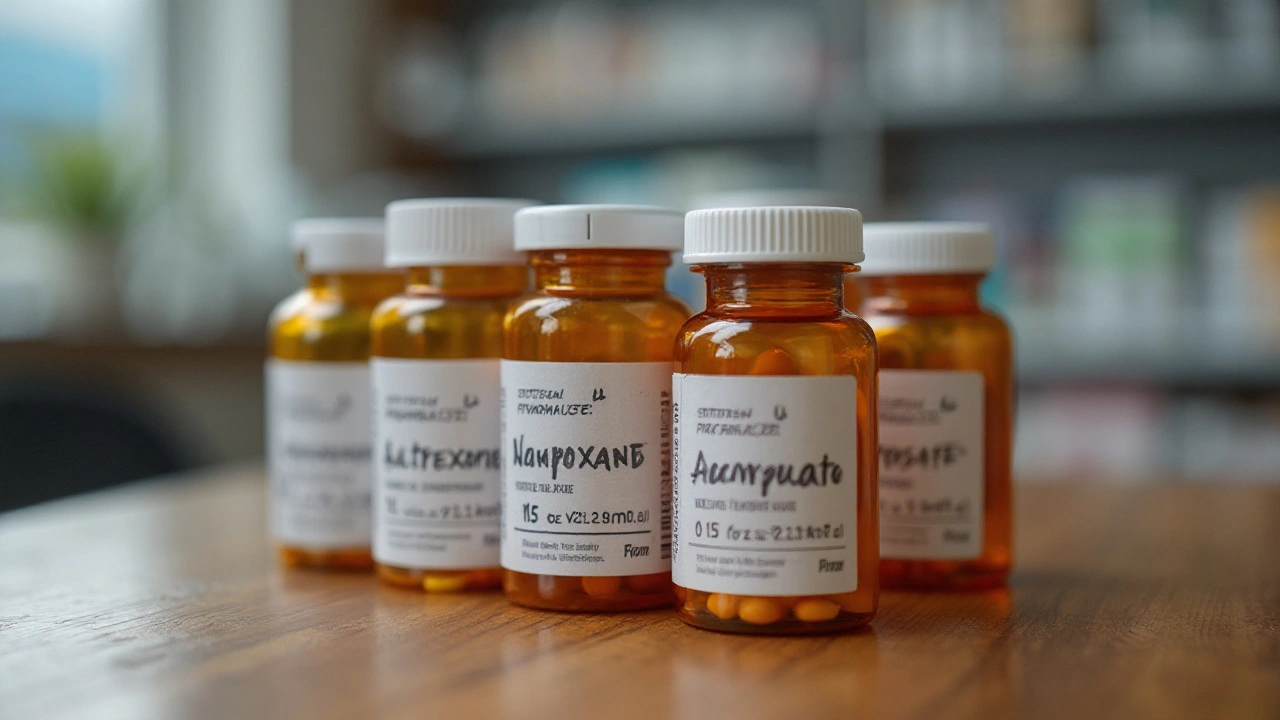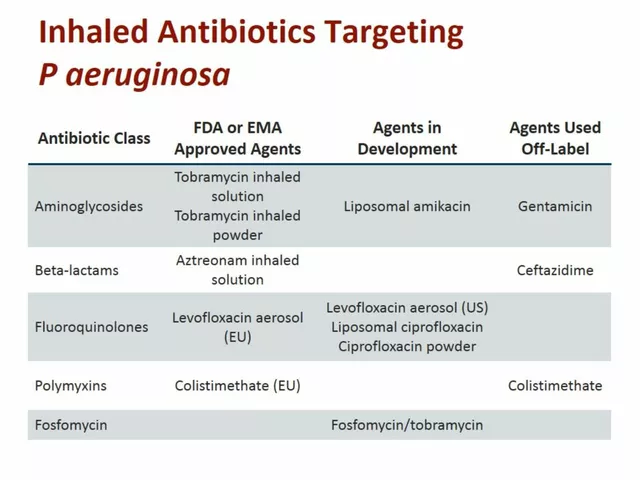When it comes to treating alcohol dependence, Antabuse has long been a tried and true option. Its ability to deter alcohol consumption through aversive reactions has helped many. However, as medical research evolves, we find more alternatives coming to the surface, each offering its unique approach to curbing alcohol use disorder (AUD). From medications that influence neurotransmitter activity to therapeutic methods that reshape behaviors and thoughts, the options are numerous and varied.
These alternatives cater to individual needs and preferences, allowing for personalized treatment strategies. This comprehensive exploration of ten such options highlights their benefits and any associated caveats, aiming to guide those seeking solutions for themselves or loved ones in their journey towards sobriety.
- Naltrexone
- Acamprosate
- Topiramate
- Gabapentin
- Nalmefene
- Ondansetron
- Kudzu Root Extract
- Benzodiazepines
- Levetiracetam
- Cognitive-Behavioral Therapy
- Conclusion
Naltrexone: A Viable Antabuse Alternative
Naltrexone stands out as one of the most recognized alternatives to Antabuse, primarily because it tackles the problem of alcohol dependence through a different mechanism. It belongs to a class of medications known as opioid antagonists. This means it works by binding to the opioid receptors in the brain, which are responsible for feelings of pleasure from substances like alcohol. By blocking these receptors, Naltrexone effectively reduces the pleasurable effects alcohol might provide, thereby diminishing the urge to drink. This makes it particularly appealing for those who struggle with the rewarding aspect of alcohol consumption, adding a layer of protection against relapse. Available in oral forms as Revia and in injectable forms like Vivitrol, it provides flexibility in treatment plans.
The effectiveness of Naltrexone in promoting abstinence has been backed by numerous studies. It consistently shows significant reductions in both the frequency and severity of relapses. Unlike Antabuse, which works by inducing unpleasant reactions when alcohol is consumed, Naltrexone doesn't cause any adverse effects with alcohol consumption itself, making it a bit more acceptable for some patients. This might explain its broad acceptance and endorsement in various clinical settings across the globe. In addition to reducing cravings, there's evidence suggesting that it helps in decreasing the quantity of alcohol consumed by individuals who do drink, leading to safer consumption levels.
Pros
- Promotes abstinence effectively.
- Reduces the risk of relapse.
- Well-tolerated by most patients.
- Available in different forms, offering treatment flexibility.
Cons
- Possible side effects include nausea and dizziness.
- Potential risk of liver damage if not correctly monitored.
One interesting aspect of Naltrexone isn't just its primary function but its ability to influence the broader spectrum of addiction-related behaviors. There's a growing body of evidence suggesting that it might even help curb compulsive behaviors beyond drinking. However, it’s important to highlight that despite these benefits, Naltrexone is not a magic bullet. Patients should understand it works best when combined with counseling, support groups, and an overall plan that addresses the root causes of drinking habits. The multifaceted approach ensures that patients not only reduce alcohol intake but also learn new coping mechanisms and build healthier lifestyles.
Naltrexone has been heralded as a cornerstone in alcohol dependence treatment, with studies like those from the National Institute on Alcohol Abuse and Alcoholism highlighting its ability to significantly increase days of abstinence when combined with therapy.
Patients considering Naltrexone should have a thorough discussion with their healthcare provider to understand the best form and dosage for their needs. The injectable version, Vivitrol, offers the convenience of a monthly dose, making it easier for those who find daily pill regimens challenging. However, monitoring is crucial, particularly concerning liver health. Regular check-ups and communication with a healthcare provider ensure any side effects or concerns are addressed promptly. All these considerations and the need for a personalized approach underline the importance of expert guidance during treatment.
Acamprosate
Acamprosate emerges as a notable competitor in the field of Antabuse alternatives, offering a different mechanism of action that appeals to many in the struggle against alcohol dependence. This medication's primary role is to restore the natural balance of neurotransmitters in the brain that have been disrupted by chronic alcohol use. When you consume alcohol over a long period, your brain adapts to the substance’s presence, altering its chemistry in harmful ways. Acamprosate works to reverse this process, helping to ease withdrawal symptoms and reduce cravings. This is a monumental shift for users who have found these symptoms to be a significant hurdle in their recovery journey.
What sets Acamprosate apart is not just its biochemical role but also its compatibility with psychosocial treatments. This compatibility is crucial as it means that Acamprosate can be used alongside therapies such as counseling and cognitive-behavioral therapy (CBT), which many experts recommend for a more holistic approach to treating alcohol use disorder. According to a study published in the Journal of Clinical Psychiatry, combining Acamprosate with structured therapy significantly improved patient outcomes in maintaining abstinence compared to medication alone. This synergy allows for a treatment plan that addresses both the physiological and psychological aspects of addiction.
Despite its promise, Acamprosate does have some limitations. One concern is that it does not prevent withdrawal symptoms when someone with physical alcohol dependence stops drinking. That means it is not a substitute for detoxification treatments needed to safely manage initial withdrawal phases. Patients need to be aware that while Acamprosate can help sustain sobriety, it does not remove the need for initial detox under medical supervision. Additionally, potential side effects such as diarrhea seem minor but can be bothersome enough to affect adherence to the medication. These side effects are usually mild, however, they emphasize the importance of discussing any concerns with a healthcare provider.
"The role of Acamprosate in reducing post-acute withdrawal symptoms is a game changer," says Dr. Jeffrey Deremath, a leading expert in addiction psychiatry. "It offers patients the chance to reclaim a balanced neurochemical state, contributing significantly to long-term recovery efforts."
For those looking into Antabuse replacements, Acamprosate’s advantage is that it doesn’t cause adverse reactions if alcohol is consumed. This factor distinguishes it notably from Antabuse, which is known for its deterrent effect based on creating a highly unpleasant reaction to alcohol. Such an approach might not suit everyone, and Acamprosate provides a gentler alternative that still supports abstinence by addressing cravings. It’s an option worth considering for those who have struggled with more severe aversion therapy methods.
One of the core aspects contributing to Acamprosate's growing popularity is its ability to support individuals in achieving long-term abstinence without the unforgiving nature of some other treatments. If you're considering this medication, discussions with a healthcare professional can shed light on whether it aligns well with your specific needs and circumstances in gaining control over alcohol dependence. With backing from scientific studies and clinical expertise, Acamprosate stands out as an empowering choice in the toolkit of recovery options.
Topiramate
Topiramate, originally an anticonvulsant medication, has gained attention as a promising option for treating alcohol dependence. This drug works by modulating neurotransmitters in the brain, which in turn decreases the rewarding effects of alcohol consumption. By reducing the pleasurable sensations associated with drinking, it aims to decrease cravings and ultimately, alcohol intake. Topiramate's mechanism makes it distinct in the landscape of Antabuse alternatives, offering a unique way of managing alcohol dependence.
One of the key benefits of Topiramate is its ability to be used off-label for those battling alcohol use disorder (AUD). While it primarily addresses alcohol consumption, it is also noted for its broader effects on improving overall well-being among users. Many patients report not only a decrease in drinking episodes but an enhanced ability to focus and engage in daily activities. Given its potential, some researchers advocate for more widespread awareness of this alternative as part of a comprehensive treatment plan.
"Topiramate offers a unique approach by targeting the brain's reward mechanisms associated with alcohol consumption, making it a valuable tool in the fight against addiction." - Dr. Sarah Johnson, Addiction Specialist
Despite its benefits, Topiramate is not without its challenges. Some patients experience side effects such as dizziness, fatigue, and cognitive issues, which can deter adherence. These symptoms vary in severity, and it's crucial to monitor and manage these effects with the assistance of a medical professional. Moreover, its efficacy and safety profile is still under review, meaning that more research is needed to fully understand its potential as a mainstream treatment for AUD. This consideration further highlights the need for personalized care and informed choices when exploring treatment options.
The growing interest in Topiramate reflects a shift towards diversifying treatment modalities for alcohol dependence. This shift signals a move away from one-size-fits-all solutions, and towards more tailored approaches that acknowledge the complexity of addiction. For those interested in exploring Topiramate as an option, engaging in open dialogue with healthcare providers is essential. It ensures that decisions are made with a full understanding of the drug's capabilities and limitations, fitting seamlessly into a broader strategy that includes behavioral therapies and lifestyle changes.
As researchers continue to uncover the potential benefits of Topiramate, its role in alcohol dependence treatment may become increasingly significant. While it's not the ideal fit for everyone, for some it may represent a breakthrough in their journey towards sobriety. With its ability to reduce cravings and moderate alcohol consumption, this medication offers a viable path forward for many. Individuals grappling with alcohol use disorder should consider its potential in consultation with medical professionals, ensuring they're equipped with the knowledge and support necessary to navigate their personal road to recovery.
Gabapentin
Gabapentin is becoming an interesting alternative in the landscape of alcohol use disorder treatments. Originally, Gabapentin was developed as an anticonvulsant medication to control seizures. However, its utility has expanded over the years, and now it finds an off-label use in the treatment of alcohol dependence. This fascinating repositioning is attributed, in part, to Gabapentin’s influence on certain neurotransmitter systems in the brain, particularly how it modulates GABA, a crucial neurotransmitter in managing brain excitability. People with alcohol use disorder often have alterations in their GABA systems, thus medications like Gabapentin that can stabilize this neurotransmitter may prove quite beneficial. Researchers have noted how Gabapentin significantly alleviates anxiety, a common challenge for those undergoing alcohol withdrawal, making it a versatile component in a comprehensive treatment approach.
According to Dr. James Garbutt, a noted expert in the field, "Gabapentin offers a promising adjunct treatment for patients with alcohol dependence, particularly for those who do not respond or cannot tolerate other medications."
One of the standout features of Gabapentin is its capacity to reduce cravings and the actual consumption of alcohol, according to several studies. Patient testimonies frequently highlight that those who take Gabapentin describe experiencing fewer urges to drink, enabling them to maintain sobriety. This is crucial since managing cravings effectively can determine the success of a treatment program. Yet, like any medication, Gabapentin is not without its potential downsides. Side effects such as dizziness and fatigue can occur, maladies that could impact everyday functioning if persistent. Furthermore, while studies are promising, the full safety profile of Gabapentin for long-term alcohol use disorder treatment warrants further research. It's important to keep the potential for misuse in mind, too, as this class of medications can possess some addictive properties if not managed correctly.
It's interesting to note that, while Gabapentin is not FDA-approved specifically for treating alcohol dependence, its off-label usage is supported by a growing body of research. In clinical settings, doctors often observe that combining Gabapentin with other treatment modalities, such as counseling or behavioral therapies, enhances patient outcomes significantly. Patients often report a balanced mood, less anxiety, and better coping skills when using Gabapentin as part of a broader treatment plan. This synergy potentially exemplifies the adage that the whole is greater than the sum of its parts. Given its multifaceted approach, Gabapentin could be a powerful ally in the fight against alcohol dependence when used judiciously and in combination with psychological support. This therapeutic combination may offer individuals a robust pathway to rediscovering life free from alcohol's grip.

Nalmefene
Nalmefene is a relatively modern player in the realm of alcohol dependence treatment. Designed as an opioid antagonist, it shares similarities with naltrexone, working by reducing the rewarding effects of alcohol in the brain. This way, it can significantly lower the risk and rate of heavy drinking episodes for those striving for better control over their alcohol intake. Though not yet FDA-approved for alcohol use disorder (AUD) treatment in the United States, its potential has been studied and endorsed in various European countries. Patients are often advised to take it on an as-needed basis, typically before a potential drinking episode, making it distinctly different from daily medications like Antabuse.
In trials and studies, Nalmefene has shown promise in decreasing the number of heavy drinking days and the overall amount of alcohol consumed. In one large study published in the journal "Lancet," participants who used Nalmefene demonstrated over a 60% reduction in heavy drinking days compared to those on a placebo. This supports its role not only as a treatment but as a harm-reduction tool for those not ready or able to completely abstain from alcohol. Such characteristics make it an appealing choice for certain individuals seeking flexibility in their treatment regimen.
"Nalmefene offers a new pharmacological option for patients with alcohol dependence," said Professor Nick Heather, an expert in alcohol-related care. "It addresses both physiological cravings and psychological impulses."
Nalmefene's targeted use pattern—only when needed—can appeal to those wary of committing to daily medication routines. It represents an empowerment of choice for many; a boon for individuals who wish to exercise personal control over their treatment. However, its availability is currently limited, and without FDA approval, some may find access challenging or costly. The medication is not devoid of side effects, either. Patients have reported dizziness, nausea, and sleep disturbances, which can sometimes impact adherence to the treatment plan. As with any drug, it's crucial for individuals to consult healthcare providers to establish whether such a treatment aligns with their medical and personal circumstances. By consulting with professionals, they can better weigh the benefits against potential risks while ensuring comprehensive evaluation and monitoring throughout use.
Given the promising results, nalmefene continues to undergo studies to better understand its efficacy and safety profile over long-term usage. Here are some key points for consideration:
- It is suitable for individuals aiming to reduce rather than eliminate alcohol consumption.
- The medication is usually taken approximately 1-2 hours before the expected drinking session.
- Its effects vary among individuals, requiring personalized medical advice.
Ondansetron
Ondansetron, initially designed to combat nausea and vomiting, particularly those induced by chemotherapy, finds unexpected utility in the realm of alcohol dependence treatment. Its connection to serotonin receptors in the brain presents intriguing possibilities for modifying how alcohol's rewarding effects are mediated. The drug doesn't only make alcohol less appealing; it also pushes back against cravings with a subtle hand by recalibrating the brain's chemical pathways.
The science behind Ondansetron’s impact on alcohol use disorder is continually evolving. Researchers have discovered that for patients, particularly those with early-onset alcoholism, Ondansetron can significantly dampen drinking urges. While still primarily an off-label venture, its low potential for serious addiction or dependency makes it an attractive option for some. However, health professionals often advise its use in tandem with therapy or additional medication, given the complexities of alcohol dependence.
Although side effects such as dizziness and headaches remain possible, Ondansetron has a reputation for being well-tolerated among users. Some patients report a mild sedation effect, which can be unexpectedly beneficial when anxiety accompanies their struggle with alcohol cravings. This sedative quality may also contribute to improved sleep patterns for some users. Despite these advantages, it is crucial to approach this treatment pathway with an understanding of its experimental nature, as definitive evidence particularly outside of small studies is still gathering.
For those who navigate their daily lives affected by the grip of alcohol, alternatives like Ondansetron inspire hope by altering conventional recovery narratives. A study published by the National Institutes of Health (NIH) indicated that "Ondansetron demonstrated efficacy among patients with early-onset alcohol use disorder," which underlines its potential, albeit with specific scopes. These encouraging findings spur continued interest and research into broader applications, especially in populations otherwise resistant to traditional treatments. When considering Ondansetron, it is vital to weigh its pros and cons and consult healthcare professionals who can offer personalized insights into its suitability.
"Research into medications that modify serotonin pathways points to potentially life-changing avenues for those combating alcohol dependence," says Dr. Sandra Goncalves, an addiction specialist, emphasizing the innovative angles being pursued in medical science.
Ultimately, Ondansetron's use in treating alcohol dependence represents a blend of traditional medicinal re-purposing and modern therapy alignment. Far from being a standalone miracle drug, it functions as part of a broader toolkit, best used under the guidance of a medical professional who's keenly attuned to both mental and physiological health needs. For those battling addiction, matching their journey's specifics with Ondansetron’s capabilities could offer a more customized route toward sustained recovery and resilience.
Kudzu Root Extract
Kudzu Root Extract, a traditional supplement hailing from China, has held a spot in alternative medicine circles for centuries. It has more recently caught the attention of researchers for its potential in easing alcohol cravings. This natural remedy, derived from the kudzu plant, contains isoflavonoids that may play a role in altering neurotransmitter pathways that are linked to dependence and addiction. Although the scientific community is actively investigating its effectiveness, many find the promise of a natural solution appealing amidst a sea of synthetic options.
Kudzu has shown some positive indications in early studies, which suggest it could decrease both the quantity of alcohol consumed and craving sensations. These studies often highlight how patients taking kudzu exhibit less interest in alcohol during controlled experiments. However, while optimism grows regarding its potential, the need for more extensive, longer-term studies persists. This calls into question its long-term safety and effectiveness. For those wary of pharmaceutical side effects or looking for complementary therapies, kudzu might be a welcomed route, albeit one that must be approached with due diligence.
A noteworthy study conducted by McLean Hospital researchers described a reduction in beer intake by 42% during a controlled drinking experiment on participants administered kudzu extract. They theorized this may be due to increase acetaldehyde levels making drinking less enjoyable. But like any supplement, kudzu is not without its caveats. Being unregulated by the FDA, its use should involve consultations with healthcare professionals to weigh risks, interactions, and ensure a tailored approach. It also opens the door to broader explorations of the Antabuse alternatives, showing how nature’s pharmacy may offer viable options.
Fit for lovers of holistic health paths, kudzu is sometimes preferred for its mild nature—a stark contrast to the harsh aversions prompted by medications like Antabuse. But remember: ‘natural’ doesn’t automatically equate to ‘safe’ for everyone. Its known risks are few but not negligible, emphasizing the importance of further study and expert guidance. As research continues to unfold, hopeful eyes remain on the horizon for kudzu, anticipating its rightful place alongside more mainstream AUD treatments.
Benzodiazepines
When it comes to handling the early stages of alcohol withdrawal, Benzodiazepines are often the go-to option. These medications work by calming the excessive activity in the brain caused by alcohol dependency. They have been highly valued for their effectiveness in managing symptoms such as anxiety and insomnia, which are common during withdrawal. Physicians appreciate their fast-acting properties, often seeing them as essential tools in detoxification processes, particularly in supervised medical settings where safety is paramount.
Despite their usefulness, benzodiazepines come with a significant caveat: the risk of dependence. Prolonged use can lead to the very issue they're sometimes prescribed to prevent—substance dependency. Because of this, they are primarily recommended for short-term use. Their function revolves around enhancing the effect of the neurotransmitter GABA, which reduces the neural stimulation that often escalates during alcohol withdrawals. This means that, while they are strong helpers at the outset, alternative treatments usually need to be sought for the longer journey of sustained sobriety.
It's worth noting that benzodiazepines can interact with other substances. As such, they're best used under close supervision from healthcare professionals who can monitor dosages and potential side effects. Some of the most commonly prescribed forms include diazepam, chlordiazepoxide, and lorazepam, each having slightly different profiles and uses based on the individual's needs. A doctor might choose one of these depending on a person's health history and specific withdrawal symptoms.
Interestingly, not all patients respond to benzodiazepines in the same way. This variance makes it crucial that treatments are tailored to fit the person rather than a one-size-fits-all approach. Speaking to this point, Dr. Mary-Anne Donegan from the Addiction Treatment Center once remarked, "For some, benzodiazepines can provide relief and stability during a crisis, yet it's always about striking the right balance, ensuring safety while aiming for a longer-term recovery plan."
In summary, while benzodiazepines are invaluable for short-term management of withdrawal, they must be part of a broader plan that includes other therapies and support mechanisms. This integrated approach ensures that patients have a path forward that extends beyond the immediate need to curb withdrawal symptoms. As addiction treatment evolves, the role of benzodiazepines will continue to be refined, potentially serving as part of a comprehensive treatment plan that encompasses other medication options such as those explored earlier, like Naltrexone or Acamprosate, and behavioral therapies like CBT.

Levetiracetam
Levetiracetam, a medication traditionally known for its role in controlling seizures, has been exploring new grounds in the field of alcohol dependence treatment. Though it has not been extensively promoted for this purpose, its potential cannot be ignored. The Antabuse alternatives landscape is ever-expanding, with Levetiracetam standing out as a notable option under consideration for addressing alcohol dependence. What makes this drug intriguing is its ability to modulate neurotransmitters in the brain, which may indirectly influence drinking behavior. The central hypothesis is that by stabilizing brain activity, Levetiracetam may reduce the urge to consume alcohol excessively.
This medication works on the principle of normalizing brain activity disrupted by excessive alcohol use. By interacting with neurotransmitters, Levetiracetam holds the potential to reduce the reward mechanism alcohol induces. Scientific curiosity lies in its off-label use as researchers strive to establish concrete evidence of its efficacy for alcohol use disorder (AUD). A significant aspect that aids in its potential adoption is the stringent examination it has undergone for other uses, ensuring a basic threshold of safety.
In the words of Dr. Jana Goodwin from the National Institute on Drug Abuse, "Exploring medications like Levetiracetam offers new hopes in creating comprehensive care strategies for AUD."
Pros
- May reduce alcohol intake by stabilizing brain neurotransmitters.
- Usage is rooted in its established safety profile for other conditions.
- Allows for potentially synergistic use with other medications for AUD.
Cons
- Consistent data on its effectiveness for AUD is still pending.
- Possible side effects like dizziness and fatigue, common in anticonvulsants, need monitoring.
- Potential for misuse, necessitating cautious administration.
In recent studies, Levetiracetam has been part of small clinical trials focusing on Antabuse replacement options. These trials aim to observe not just the quantitative reduction in alcohol intake but also qualitative aspects like improving life quality for affected individuals. Researchers are hopeful yet cautious since translating its success in other neurological uses to treating AUD requires extensive evidence. Though not currently FDA-approved specifically for alcohol dependence, its presence in the arsenal of treatment possibilities signifies a shift towards more inclusive and broad-spectrum medication approaches.
Levetiracetam, with its roots entrenched in neurology, presents an interesting twist in the way we perceive treatments for alcohol dependence. Its non-traditional approach reminds us that the journey to sobriety might have diverse paths, some of which go beyond conventional boundaries. Ensuring adaptability and personalization in treatment plans is essential in catering to varied patient needs, supporting the narrative that recovery is a highly individualized process.
Cognitive-Behavioral Therapy
Cognitive-Behavioral Therapy, often abbreviated as CBT, is a therapeutic approach with its roots firmly grounded in the interrelationship between thoughts, feelings, and behaviors. This method is especially pertinent for treating various conditions, including alcohol dependence. Unlike medications, CBT does not involve any drugs or prescriptions. Instead, it focuses on helping individuals develop coping strategies, challenge distorted beliefs, and modify harmful behaviors. The underlying theory of CBT suggests that our thoughts influence our behaviors and emotions. By changing the erroneous thought patterns, individuals can alter their behaviors and achieve better emotional health.
The efficacy of CBT in treating alcohol use disorder lies in its structured and and interactive nature. A therapist guides individuals through a series of sessions, encouraging them to identify situations where they are most likely to drink and create strategies to manage these situations without alcohol. By teaching skills for recognizing triggers and avoiding them, CBT offers sustainable solutions for managing cravings and relapse. It essentially empowers individuals, putting the control back in their hands. A notable study published in the Journal of Substance Abuse Treatment found that combining CBT with medication treatments could enhance treatment outcomes significantly.
One of the defining features of CBT is its focus on the present. While it acknowledges the influence of past experiences, CBT is primarily concerned with addressing and overcoming current challenges. This approach establishes clear, actionable goals, providing a sense of progress and achievement. Sessions often involve homework assignments, where patients practice the learned strategies in real-world situations, reinforcing the coping mechanisms. An esteemed therapist, Aaron T. Beck, often highlighted the utility of such structured tasks, stating,
“Teaching patients how to think, not what to think, is the primary aim of CBT.”
Effectiveness aside, CBT also offers a host of benefits related to accessibility. Since it doesn’t require medications, CBT can be a suitable option for those who may be cautious about drug treatment or have medical contraindications. Moreover, self-help CBT is possible through various online platforms and books, providing a cost-effective alternative. While some can benefit from these resources, most might find the guidance of a trained therapist beneficial. CBT does necessitate commitment and may require sustained effort, but the autonomy and control it provides individuals often result in higher motivation and adherence to the treatment plans.
Conclusion
Exploring the landscape of alternatives to Antabuse for treating alcohol dependence reveals a world of possibilities designed to cater to diverse patient needs. As we have seen, options like Naltrexone and Acamprosate offer treatments that focus on reducing cravings and stabilizing brain chemistry, without the adverse effects associated with Antabuse. These alternatives often provide a more integrated approach, addressing the complex neurochemical substrate of addiction. This is crucial because the journey to sobriety differs from person to person, and no single treatment fits all. Medications such as Topiramate and Gabapentin further illustrate the scientific progress in understanding how to modulate brain activity effectively to reduce alcohol consumption. Although they may not be as widely recognized as Antabuse, their off-label use presents new hope and reduced stigmatization associated with alcohol use disorder (AUD).
Behavioral therapies, like Cognitive-Behavioral Therapy (CBT), bring another layer of depth to treatment strategies. CBT works by helping individuals reframe the thoughts and attitudes driving their addiction, offering them practical tools to handle situations that might trigger relapse. These psychological methods often complement pharmacological solutions, laying a more comprehensive framework for recovery. It is interesting to note that natural supplements such as Kudzu Root Extract have emerged as alternatives, tapping into holistic health practices that appeal to those wary of pharmaceutical interventions. Though research is still emerging around these natural aids, their potential has caught the eye of clinicians and patients alike. "Mindful recovery benefits from choices," remarks addiction specialist Dr. Jonathan Meyers, "and integrating varied methods forms a robust support system."
One cannot ignore the need for carefully considering the cons of each treatment. For instance, Gabapentin and Benzodiazepines come with risks of dependence, highlighting the importance of medical supervision. Nalmefene and Levetiracetam require more robust research to firmly establish their safety and efficacy profiles. Despite their promise, the side effects and potential for misuse urge a cautious approach. This variability in effectiveness is why personalized treatment plans should remain at the center of any intervention strategy. Matching the right treatment to the right person at the right time is the real key to overcoming alcohol dependence.
"Flexibility in treatment choice and timing is essential to achieving the best possible outcomes in alcohol dependence recovery," says Dr. Lisa Hatfield, a renowned expert in addiction medicine.
| Alternative | FDA Status | Primary Benefit |
|---|---|---|
| Naltrexone | Approved | Reduces Cravings |
| Acamprosate | Approved | Stabilizes Brain Chemistry |
| Topiramate | Off-label | Decreases Alcohol Intake |
| Kudzu Root Extract | Not Regulated | Natural Reduction in Cravings |
Ultimately, the choice of Antabuse alternatives depends on individual circumstances, preferences, and the guidance of healthcare professionals. As research continues to unravel the complexities of addiction, new treatments will undoubtedly emerge, offering more hope to those striving for sobriety. While Antabuse serves as a significant tool in the treatment arsenal, these current and emerging alternatives broaden the spectrum of care, catering to a wider array of needs. They represent both progress and the deepened understanding of addiction and recovery, signaling a hopeful future for individuals on the path to overcoming alcohol dependence.






Post A Comment